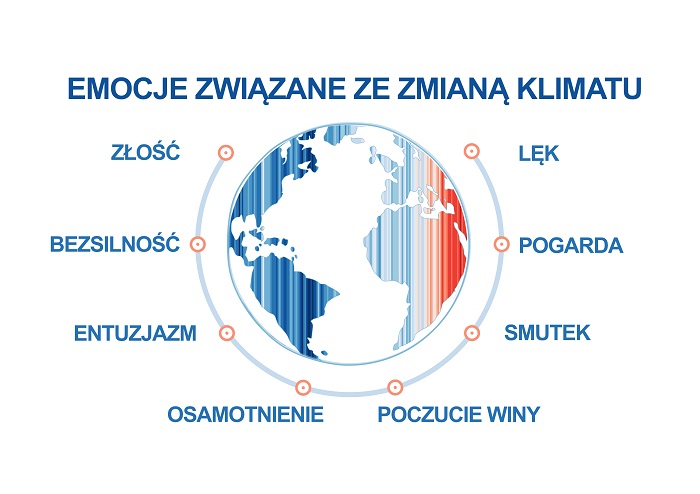
A team of researchers from Poland and Norway has developed a questionnaire to detect and measure the level of emotions related to climate change, the Nencki Institute of the Polish Academy of Sciences reports.
The results were published in the journal Global Environmental Change.
Extreme weather phenomena, melting glaciers, increasing threats to many species - the effects of climate change are increasingly felt all over the world. The growing effects of these changes evoke strong emotions in many people: anger, sadness, helplessness and anxiety about the future.
'People think about it more and more often, feeling the entire spectrum of emotions that we decided to explore,’ says Professor Artur Marchewka, head of the Brain Imaging Laboratory at the Nencki Institute of Experimental Biology in Warsaw.
A team of scientists, which, in addition to representatives of the Nencki Institute, also included researchers from the Norwegian University of Science and Technology (NTNU) in Trondheim, SWPS University and the University of Warsaw, dealt with the 'climate anxiety' and 'climate depression' phenomena described in the media.
'I started to wonder what these concepts, often positioned against the background of anxiety or depressive mood disorders, actually meant,’ says Michalina Marczak, the leader of the research concept and a doctoral candidate at NTNU in Trondheim, Norway.
As part of the study, scientists checked whether the term 'depression' accurately defined people's feelings about climate change. Like depressive disorders, the concept of 'anxiety' in clinical terms most often leads to withdrawal and suffering on an emotional level. To find out, researchers first conducted in-depth interviews with a broad group of people who experienced strong emotions related to climate change.

'I decided to approach the topic in an exploratory manner, without any assumptions. I asked general questions such as: +how do you feel when you think about climate change?+, +how does it affect your life?+ It turns out that there is a whole range of emotions associated with this phenomenon. It is indeed common to experience sadness, but it does not mean depression. It is sadness because of everything that disappears forever, such as extinct species of plants and animals. There is also despair about what will happen to future generations and grief about lifestyles that are disappearing forever. Anger was also mentioned, a lot of anger, mainly directed against political leaders and corporate management, which many respondents blamed for the climate crisis,’ says Marczak.
Participants in the study (financed by Norwegian funds) also spoke about fear, but in the context of fear about the future. They were concerned, sometimes even terrified, especially about the fate of future generations. The respondents also spoke, among other things about the feeling of helplessness, isolation, guilt. Their responses also included positive emotions related to involvement in climate action, especially when these actions were undertaken together with other people who shared their ecological values.
'This is one of the first projects in the world aiming to understand what happens at the emotional level when we think about climate change,’ says Professor Marchewka.
Based on the interviews, the researchers proposed a set of specific emotions that the respondents felt in connection with climate change.
'We started with twelve emotions, defined them, and then created a wide range of statements to represent them. Then, as a result of empirical research (including a series of factor analyses), we found that the emotional experience of climate change could be most accurately and reliably described using eight categories. And they became part of the final Inventory of Climate Emotions (ICE),' says Marczak.
The emotions identified and described in the study included: climate sorrow, i.e. grief due to the perception that climate change is irretrievably changing the world and causing great losses to life on Earth. Additionally, anger was included, defined as anger and frustration that people in power have not been doing enough to mitigate climate change or that they have been intentionally harming the climate. The list also included hopefulness (positive emotions associated with action for the environment) and climate discontent (reluctance to take pro-climate activities and downplaying this issue). The questionnaire is used as a tool for researching individual climate emotions by scientists in many European countries including Ireland, Sweden and the Netherlands.
'This tool opens up at least a few new research directions. For me personally, the most important aspect is related to pro-climate activities. Understanding the emotions behind this is an important step in building programs that motivate people to change their behaviour,’ says Professor Marchewka.
The researchers believe the questionnaire has already provided a wealth of information on what lies behind the terms 'climate anxiety' and 'climate depression'.
'There was a big knowledge gap related to this, and at the same time we saw crowds protesting in the streets. We then realized that these people also had emotions other than fear. By examining climate emotions, we can also better understand what is happening to our mental health in the context of current world events,’ says Professor Marchewka.
Find out more about the project here. (PAP)
Anna Bugajska
abu/ agt/ kap/
tr. RL













